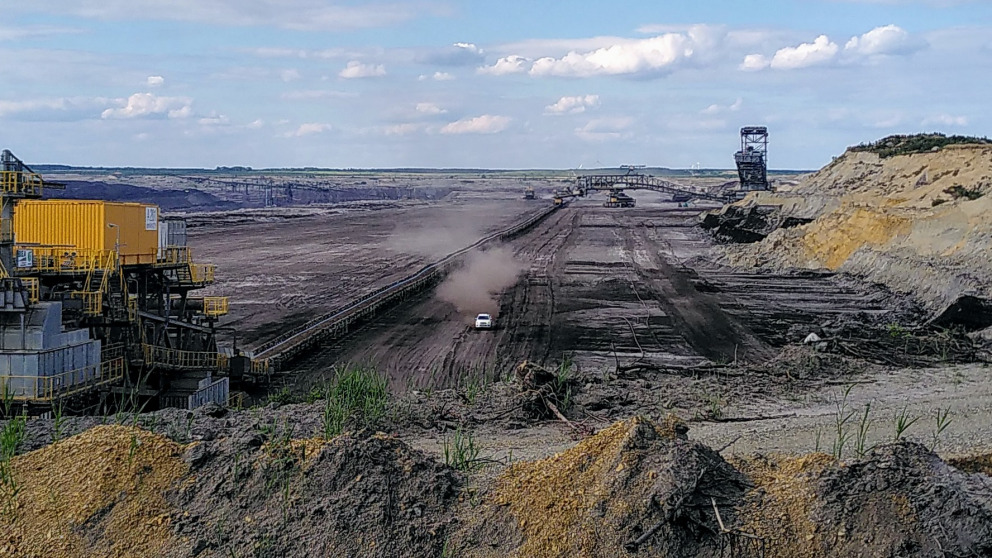Inspiring a just transition or just buying time?
18.02.2022

The long-running dispute before the Court of Justice of the European Union (CJEU) between Poland and the Czech Republic over the Turów open-pit coal mine on the Polish side of the border came to an end two weeks ago. Under the agreement reached by the two countries, the Czech Republic is to be compensated for environmental harms caused by the mine’s operation. In response, the Czech government withdrew its complaint to the CJEU on 3 February.
The Turów complex consists of an open-pit lignite mine that supplies the nearby Turów Power Station, which currently accounts for around 8% of Poland’s total electricity output. The complex is located close to the country’s borders with Germany and the Czech Republic and the broader region is historically reliant on lignite extraction. The conflict arose when Czech citizens concerned about the mine's impact on ground water levels took the matter to the European Parliament’s Committee on Petitions. The matter escalated in 2021, when the Czech government sued Poland, arguing that it had violated European environmental assessment regulations when it extended the permit for the mine’s operations. In September 2021, the CJEU issued an interim ruling that required Poland to halt mining operations in order to prevent further harm or be fined €500,000 per day. In the resulting stand-off, negotiations between the two countries were initiated by former Polish Climate and Energy Minister Michal Kurtyka and concluded under the current minister, Anna Moskwa.
Under the terms of the deal struck between the two countries, Poland is to pay €35 million in compensation to the Czech government and the utility PGE, which operates the mine, will pay an additional €10 million to the Liberec regional government. The money will be spent on the construction of an anti-filtration screen to prevent the outflow of underground water from the Czech Republic, an earth embankment, environmental monitoring as well as the creation of a micro-fund for local projects.
The Polish government would like to see coal mining and coal-fired power generation continue in Turów through to 2044 as part of a “social contract” struck by the government with industry trade unions. This agreement stands on shaky ground as it relies on the EU approving state aid that would support the operation of Polish coal mines through to 2049. Observers argue that the European Commission is unlikely to greenlight such measures. The Polish government has shown some interest in shifting towards a cleaner energy system based on wind and nuclear but the social contract is the only official document published so far that proposes concrete measures for the structural transformation of coal regions.
The consequences of the Turów settlement become clear when we zoom in on the architecture of an EU financing instrument dedicated specifically to supporting coal regions in transition – the 2020 Just Transition Fund (JTF). Its resources are allocated to regions, based on detailed territorial plans drafted by regional authorities. However, the money does not flow directly to the regions, but is disbursed under shared management with national governments. The Polish subregion of Zgorzelec, where the Turów complex is located, did not receive any money due to the Polish government’s lack of clear vision for a local low-carbon transition. As a consequence, local actors have shifted their focus from the European and national level to crowding in private investment through bottom-up initiatives – resulting among other things in the establishment of the largest Polish PV farm in Zgorzelec.
Poland refuses to pay the fines incurred during the period between the announcement of interim measures by the CJEU and the finalisation of the settlement, but these penalties will be offset against EU funds that were meant to be earmarked for Poland. Given Poland’s heavy reliance on these measures, the EUR 68.5 million in penalties will not go unnoticed, especially not on top of the EUR 69 million owed for Poland’s recent rule of law breaches.
This month’s settlement is a missed opportunity to negotiate an earlier coal-phase out for the region. It mitigates only some of the environmental harms at the root of the dispute while ignoring the elephant in the room: the threat posed by the dangerous level of carbon dioxide in the atmosphere. A firm decision to ditch coal would have improved the likelihood of securing JTF funding for the subregion in the years ahead. Each year of Poland’s disengagement with the inevitable decreases the likelihood of a successful economic and social transition in Zgorzelec. The Turów complex will have to be shut down eventually. Its closure will cost tens of thousands of jobs. Currently, the only hope lies in local actors advocating for a faster transition as well as regional Lower Silesian authorities, who have invited stakeholders from Zgorzelec to contribute to the development of the JTF territorial plan.
The Turów saga is far from over. The Czech branch of Greenpeace already plans to bring another case against the Czech government to the European Commission, since they believe the final decision in the case does not remedy long-term environmental harms or limit coal extraction. Given the pressure to fulfil the EU’s net emissions reduction targets, it seems unlikely that the complex will continue to operate at full capacity through to 2044.
More detailed information on the potential role of EU funds in supporting the just transition in the border region can be found in the IASS Policy Brief European Funding for Structural Transformations in the German-Polish Border Region.